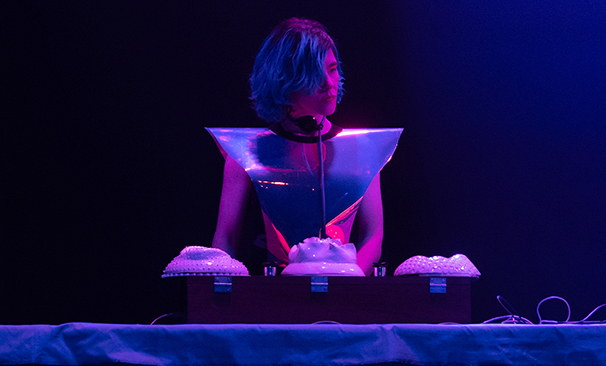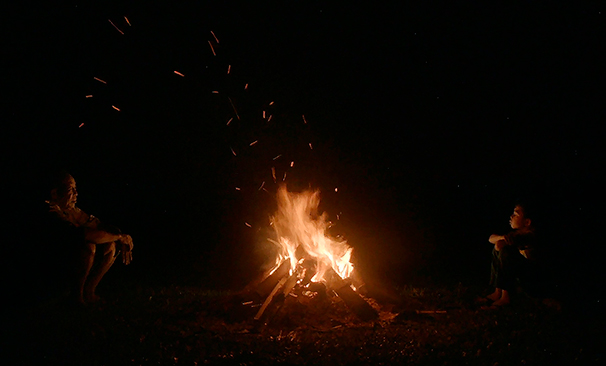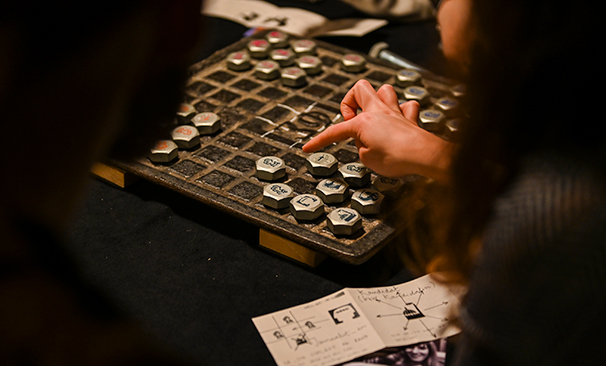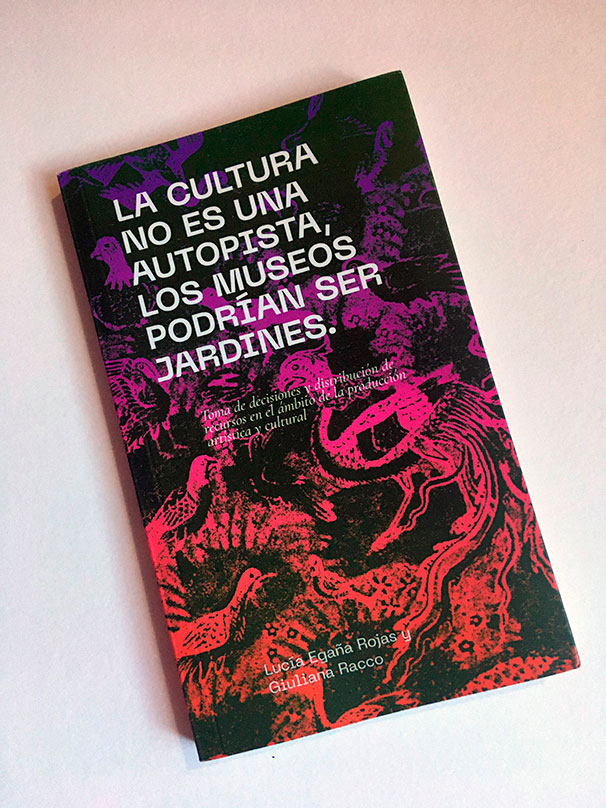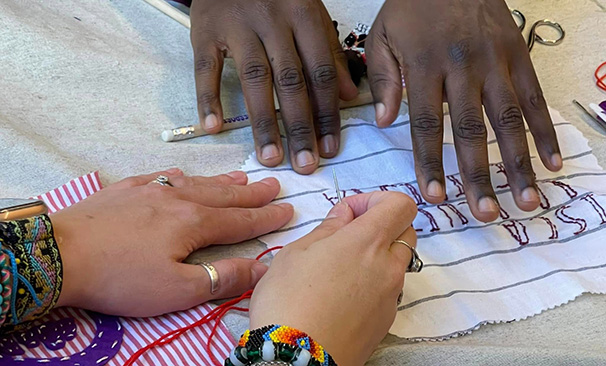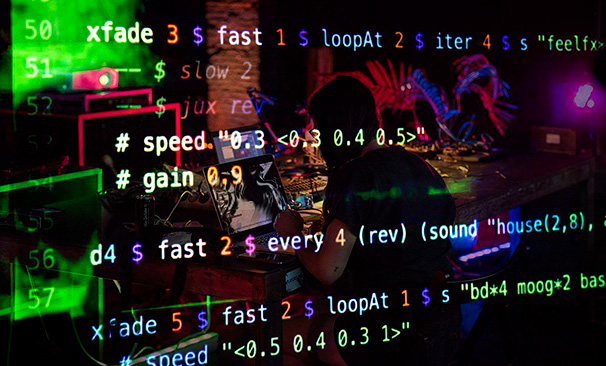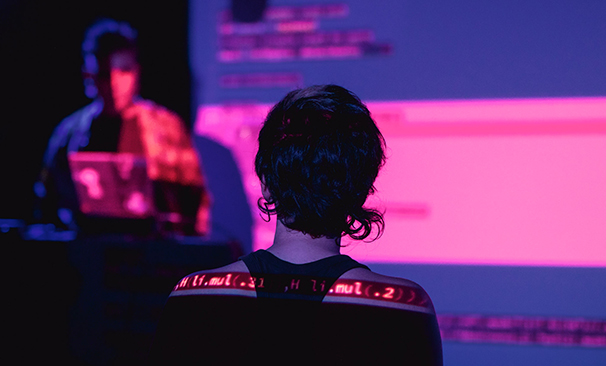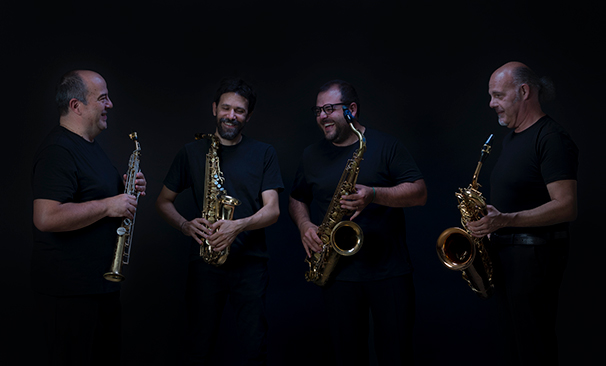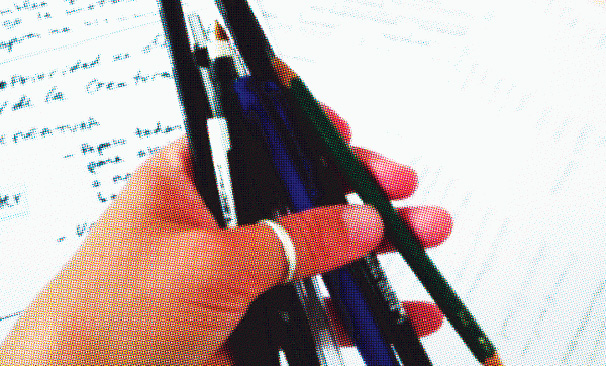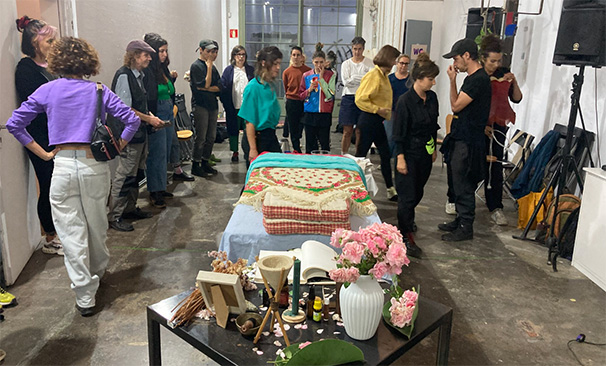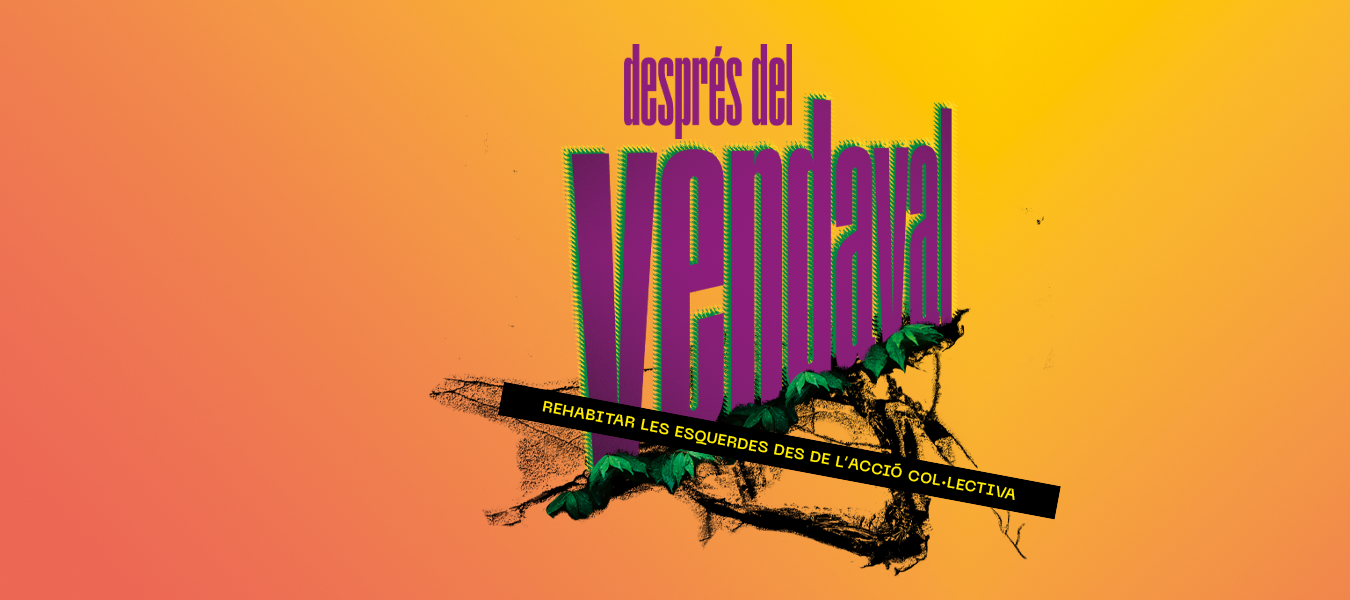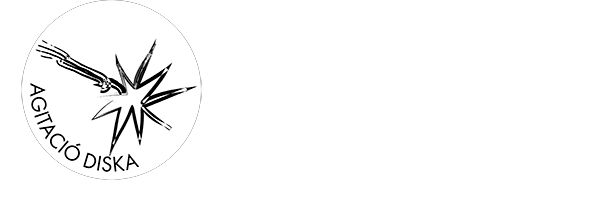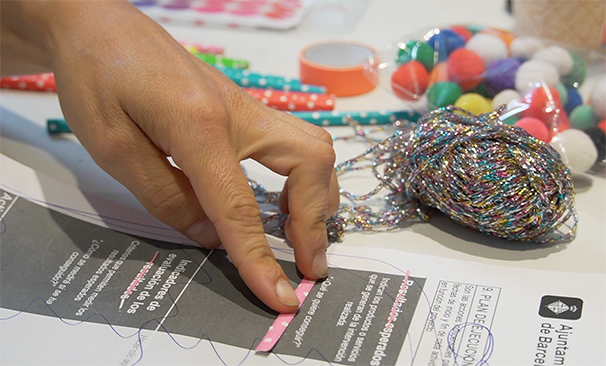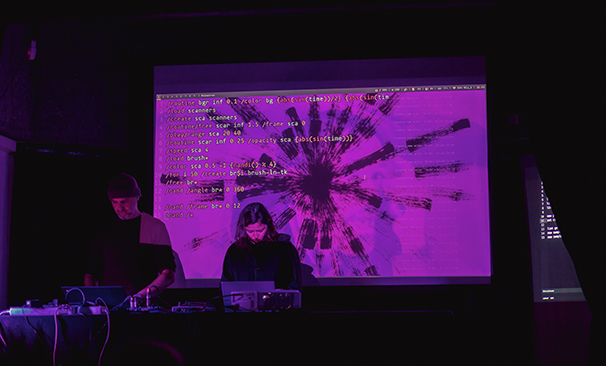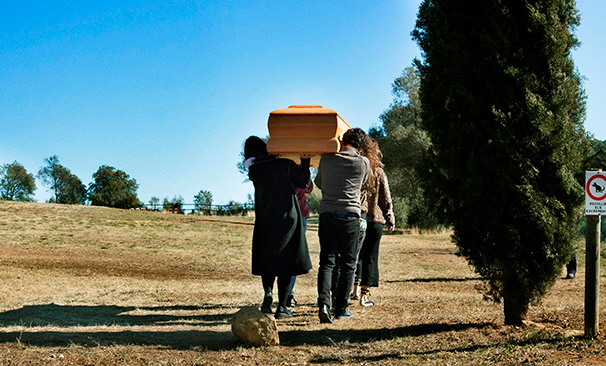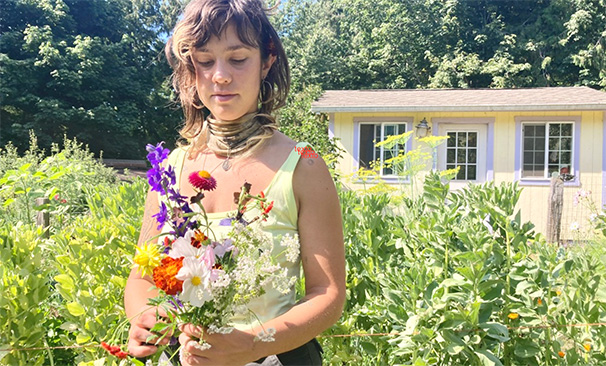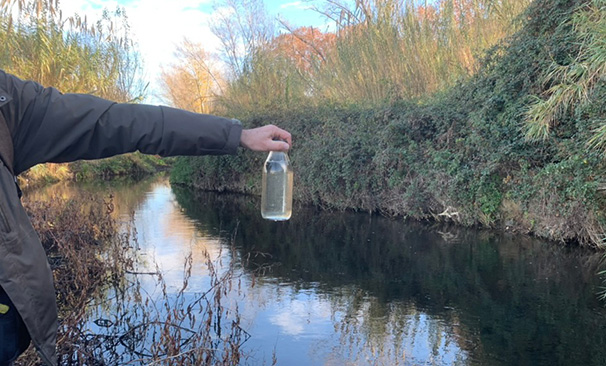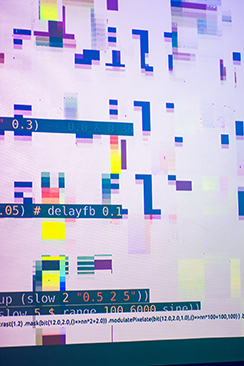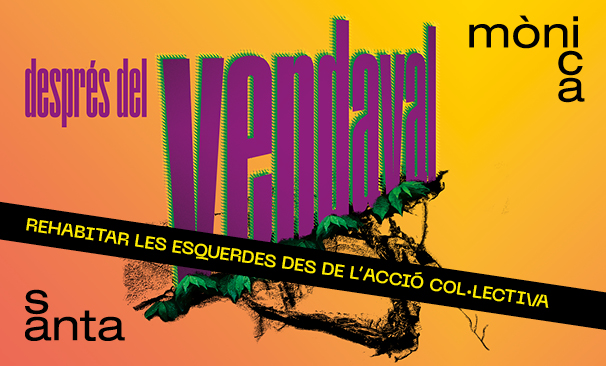What are you looking for?
You might be looking for...
Després del vendaval
Re-inhabiting the cracks through collective action

Exhibition
Després del vendaval (After the gale) brings together seven groups that, with their political and poetic practices, cross invisible areas in which systemic violence is exercised and rights are disregarded. It is from this invisibility that the voices of the collectives find a way to subvert the limits of the norm, occupy liminal areas and widen institutional cracks.
We are perplexed by the delusion of normality in which we live. Privileges, exclusions and hegemonies establish political, social, cultural and economic institutions, and deafen struggles. How can we reverse the dullness of museum walls so that collective action goes through their walls and foundations? In other words: When all these voices speak from there, do the gardens [1] of those who speak of rights tremble? “No person is illegal”, “Houses without people, people without houses” “Are you tired of hearing it? We are of living with it”, “From the river to the sea”, “Your hatred does not fit in our streets”… These slogans sweep through the streets like gales through meadows and sometimes infiltrate museums.
We entered the institution in a rush to pierce that space, to bring the protest closer and reveal fragilities. We break into the institution exploring its semiotic limits, even assuming a certain degree of domestication. This territory, between calm and chaos, is where we want to talk about the conflicts and negotiations between the various cultural and political forms and practices, a tension in which various ways of understanding the world and of inhabiting it meet.
In an exercise of common and collective imagination-action, intervention in the institutional space of these groups sneaks through the cracks opened by the increasingly present narratives about the right to participation, expression and creation in culture. Fissures that, declared from politics[2], still have to be deployed politically and instrumentally. The collective incursions of this project are a move in this direction: they question us about who these rights represent and who is left out, what cultural and social rights are defended and which are not, and they also question us about the capacity that institutional forms have to contain these questions without deactivating them.
No struggle is launched from a barren land. Therefore, as an extended canvas and an incomplete taxonomy, we collect a genealogy of collectives that have been successively and contemporaneously articulated since 1992 in the Catalan territory. Their actions, their aspirations and their failures have cut a path of the efforts of activists and creators at various key moments in our recent history.
Looking ahead and at the present, we also open a dialectical space that aims to explore conflicting debates on the various forms of the social, the urban, the technological, the vital, in which we intend to stir up conversations that allow listening and the exchange of positions. This sub rosa[3] space, conceived as a potential toolbox, speaks from the anonymous voice, stripped of actors, to raise questions that interest the common space.
This intervention was developed over ten months, during which concepts such as pain, autonomy, agency, sovereignty, listening, subversion, power, times, bodies, ecology, taboo, stigma, silence, the invisible, the visible, memory or resistance were unpacked. Transiting that garden is necessary to inhabit the spaces of others, hear their bodies, dress their shells, weave the wickers that welcome them. Crossing the forest to, perhaps, stay. Entering other worlds and living radically in them.
Tere Badia, Irati Irulegi (Idensitat) and Montserrat Moliner
Curators of the exhibition
Collectives / Exhibited work:
Agitació Diska / Junk Journey
DU-DA / Tu cuerpo, la ofrenda. De la planta, la fiesta
La Creatura / Oficina (de Reparación) de los Sueños Desistidos
LAC - Laboratori d’Art Comunitari / Identitats (perdudes - retrobades) / Fanny Dolls / Així som; fortes i unides / Prision Tour / Cuerpo visto / Vivo en un jardín de flores
Sindillar / La ventana in/cómoda; Tránsitos entre la hostilidad y la hospitalidad
Sitesize / Besòs mirall interior
TiritiTrans Trans Trans / Métete en la cama con una puta
Exhibition’s activities:
11/10 – 6 pm Ancestral Intelligences, with Tajëëw Díaz Robles, Domingo Hernández Ixcoy and Abadio Green, Festival IndiFest.
17/10 – 5 pm Artivismo textil, Sindihogar/Sindillar.
18/10 – 7 pm Il silenzio ondulato, with Sidera Saxophone Quartet, Festival Mixtur.
25/10 – 4 to 8 pm From Apothecary to Art: Personaliza and Reuse Medicine Waste. Junk Journey Workshop, Agitació Diska.
30/10 – 6:30 pm Presentation of the publication La cultura no es una autopista, los museos podrían ser jardines, amb Giuliana Racco i Lucía Egaña.
8/11 – 5 and 7 pm El candidato (o candidata), with Marc Villanueva Mir and Gerard Valverde Ros, Festival IF Barcelona.
9/11 – 11.30 am to 7 pm Tagging Day. Collective Cataloging of Fanzines, La Fanzinoteca.
12/11 al 16/11 – 11 am to 8 pm Live coding, with TOPLAP Barcelona, Difraccions cycle.
Programme based on live coding: round tables, talks, concerts and collective experimentation with the local node of the TOPLAP international community.
20/11 and 27/11 – 6 pm Territorial HYDROcustody Workshop, Sitesize.
29/11 – 6 pm 3rd Urgent Evocation / Activate – Desactivate, research group Cosmografías.
29/11 and 13/12 – 6 pm Get in Bed with a Whore, TiritiTrans Trans Trans.
04/12 – 5 pm Mutant Economies Laboratory: Speed dating of projects, La Creatura.
14/12 – 11:30 h a 14:30 h Minca. Remix Workshop of a Collectiva Publication, La Fanzinoteca.
09/01/25 - 17:30 h a 20 h El teu cos, l'ofrena, DU-DA.
11/01/25 – 6.30 pm From the plant, the party, DU-DA.
Sub Rosa Space (level 2):
9/10 – 6 pm Occupation (Housing, Public Space, Tourism).
6/11 – 6 pm Techno-Disobedience.
21/11 – 6 pm Margins (Work, Migration, Governance).
12/12 – 6 pm Universal Basic Income.
[1] We refer to the metaphor proposed by the book La cultura no es una autopista, los museos podrían ser jardines. Toma de decisiones y distribución de recursos en el ámbito de la producción artística y cultural (Culture is not a highway, museums could be gardens. Decision-making and distribution of resources in the field of artistic and cultural production), self-published by Lucía Egaña and Giuliana Racco in 2024, with contributions from various authors. This book has guided the spirit of this project.
[2] Cultural rights, as defined by the United Nations, safeguard the rights of individuals, communities and groups to cultivate and express their vision of the world and the meanings they attribute to their existence. The cultural rights framework offers a broad perspective, addressing key challenges such as diversities, the guarantee of equity, the fight against inequalities and the strengthening of democracies, the right to participation and cultural expression and the role of cultural institutions.
[3] The Latin expression sub rosa (Neo-Latin for "under the rose"), denotes secrecy or confidentiality, similar to the Chatham House Rule.
Collectives:
Agitació Diska
DU-DA
La Creatura
LAC - Laboratori d'Art Comunitari
Sindillar
Sitesize
TiritiTrans Trans Trans
With the collaboration of Iconoclasistas and La Fanzinoteca
Curatorial board:
Tere Badia
Irati Irulegi (Idensitat)
Montserrat Moliner
Exhibition design:
La embajada tropical. Estrella Benito i Samantha Fung
Illustrations:
Lourdes Soto
Sound creation:
Damien Bazin
Lighting design:
Maria José Domínguez - Intervento
A production by Santa Mònica
